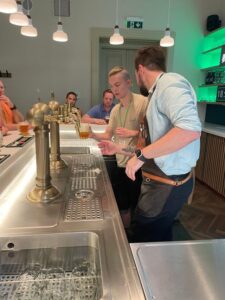From the U.S. to Czechia: A Student’s Perspective on Life Abroad
Written by Nick
The Czech Republic is an incredible country, a sentiment shared not only by me but by many other internationals I’ve met. Prague, in particular, stands out with its vibrant architecture, walkable streets, lush parks, and breathtaking views—locals take immense pride in their city. However, for Americans like myself and other Westerners, living here comes with eye-opening cultural differences worth exploring.

University Life: Generalization vs Specialization
In the US, our bachelor’s degree typically lasts four years as a full time student, but many people extend it out to five or six years even. This is unlike the Czech Republic where this degree only takes three years to complete. Why this difference? Simply, in the United States, our first two years of education are focused on getting a general education, where you learn math, English, science, history, philosophy, etc. We do this because we Americans emphasize having well-rounded knowledge. Czechia however gets right to specializing in your degree field. As an Economic Data Science (EDS) student, my first semester went right into Microeconomics, Math for Economists, Programming, Statistics, and Data Analysis.
Cost of Living: An Affordable Country
Before my studies, I had applied to numerous schools throughout both America and Europe. In every case, the Czech Republic won in terms of affordability. This is especially true when coming from the US – a country notorious for absurdly high tuition fees. The cheapest schools in the US were at least twice the tuition as here, many four-five times, some over ten times as much. Dormitory costs are also the same, with US dorms being two-four times more expensive.
Restaurants, cafes, and pubs are also much cheaper in Czechia. I find that eating out in this country is about half the cost as it is back at home; a beer is a fraction of the price. Tipping here I find is also less important. While it is polite to tip here, I never feel forced to tip, unlike America where you almost have to tip. When you do tip here, it is only about 10%, while Americans expect 20% at least. This is due to the fact that in America, servers are allowed to be paid less than minimum wage, as it is expected that the customer will pay the workers wage.
Transportation & Infrastructure: Much Superior to the US
Perhaps the first thing an American would notice when coming to Prague, would be the transportation infrastructure. Prague is rated as one of the best cities in terms of public transport. Prague would not be Prague without the constant sight of trams roaming around. Unlike American infrastructure with our concrete-jungles, Prague is lively and very vibrant. There are parks everywhere, trees all around many places, it is very walkable, very clean, and the buildings are a beautiful mix of old European architecture.
This is in great contrast to the United States where we are incredibly car-dependent. I learned to drive at 15, and got a car at 16, which is a very normal thing in the US. We learn to drive so young because we need to drive; without a car and license, you are almost trapped, unlike Czechia where you can simply just walk anywhere. And yes, public transportation does exist in the US, but it is only big in big cities, other places, it is very limited, and often unsafe.
Social Norms: Small Talk, Work, and Smiling
Americans first visiting the Czech Republic may mistake the Czech people for being rude to them. This is not the case. It is a purely cultural difference. In the US, our restaurant servers, baristas, bartenders, and cashiers are often very bright, vibrant, they let out huge smiles, and will try to make small talk – but this is all incentivized by wanting a good tip. Czechs on the other hand are more real and straightforward. They do not like small talk with strangers, and they do not like pretending to smile. Overtime, I have grown accustomed to this way of life, and in fact I have learned to embrace it.
Work life in Czechia is also a lot more chilled out compared to the States. Americans have a huge work culture around hustling and ‘grinding’ for cash. People may brag about how many hours a week they work, how long they can go without a day off, how long they have gone without a vacation. Czechs I find are a lot more chill. Americans live to work, Czechs work to live. Czechs take their relaxation much more seriously, are less willing to work outside of normal hours, and make sure they take their vacation time.
If you want to see a Czech open up a bit, maybe you should find them in their most natural habitat: the pub. Beer culture in the Czech Republic is very real. There are pubs on every street, and it is normal to grab a quick beer during the day, or to go chill at the pub after work. I have even had meetings over some beer. Perhaps Americans would learn to chill out a bit more if they just had a pint or two.
Final Thoughts
Czechia is one of my favorite countries, and Prague is truly a one-of-a-kind city. While adjusting to the cultural differences may take some time for an American, the experience is incredibly rewarding and offers a fresh perspective on life abroad. Embrace the adventure, enjoy the journey, and as always—happy travels